16 Aug NC2015: The National Conference Debate on Same-Sex Marriage
Steve Dennie, Communications Director
 The 2015 US National Conference considered two proposals regarding same-sex marriage and homosexuality. They were sibling proposals submitted by Jeff Reser (right), pastor of East Washington UB church in Ashley, Mich.
The 2015 US National Conference considered two proposals regarding same-sex marriage and homosexuality. They were sibling proposals submitted by Jeff Reser (right), pastor of East Washington UB church in Ashley, Mich.
The proposals were presented on May 18 at a United Brethren regional meeting in Sunfield, Mich., attended by pastors and laypersons primarily from Michigan churches. The next day, the proposals were presented at a regional meeting in Willshire, Ohio, and later at a meeting in Lancaster, Ohio. So they predate the June 26 Supreme Court ruling which recognized same-sex marriage nationwide. Much of the motivation, as expressed at Sunfield, was to shield ministers and churches from potential lawsuits should they refuse to solemnize or host same-sex weddings. Both proposals contained language from a legal organization called Alliance Defending Freedom.
Proposal 10. Proposal 10, “Same-Sex Marriage,” would add a paragraph to our existing statement in the Discipline on “Marriage.” It passed with a couple amendments as given below. The paragraph in bold is the new paragraph which was part of the original proposal. The words in bold italics were added by amendment from the floor.
¶122 Marriage
Marriage was instituted by God and is regulated by him. For this reason, the Church must resist all attempts to alter marriage from what the Bible has revealed about it. The purpose of marriage is companionship between a man and a woman (Genesis 2:18) in a permanent relationship which can end only when one of the partners dies.
A Christian should marry only another Christian (1 Corinthians 7:39, 2 Corinthians 6:14). Their relationship is to express God’s original intention for marriage: the wife’s role alongside her husband as an equal.
Because God ordained marriage and defined it as the covenant relationship between a man, a woman, and himself, the Church of the United Brethren in Christ USA will only recognize marriages between a genetic, biological man and a genetic, biological woman. Further, the ministers classified with the authority to conduct weddings shall only participate in weddings and solemnize marriages between one genetic, biological man and one genetic, biological woman. Finally, the facilities and property of churches in covenant with the Church of the United Brethren in Christ USA shall only host weddings between one genetic, biological man and one genetic, biological woman.
Proposal 11. Proposal 11, “Illicit Sexual Relations,” sought to expand the current statement on “Illicit Sexual Relations” and to add four more paragraphs. After much discussion, it was tabled in favor of a study committee. The text of Proposal 11 will be included later in this article.
That’s the end result. Now let’s eavesdrop on the business session to see how we got there.
A Testimony from Canada
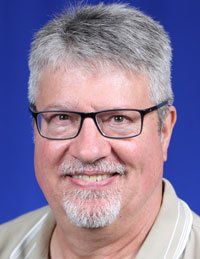 Todd Fetters, director of National Ministries, chaired the proceedings. Early on, he invited to the platform Brian Magnus (right), bishop of the United Brethren Church in Canada. Magnus told about the situation in Canada regarding gender issues, giving a peak at what the future may hold for the United States. Here is what he said (with some editing).
Todd Fetters, director of National Ministries, chaired the proceedings. Early on, he invited to the platform Brian Magnus (right), bishop of the United Brethren Church in Canada. Magnus told about the situation in Canada regarding gender issues, giving a peak at what the future may hold for the United States. Here is what he said (with some editing).
“We want to welcome you to the post-Christian world. It’s not a great place to be, but it’s where we are.
“One of the first stages in the grief process is denial, and that’s kind of where we were ten years ago. Our Parliament had just passed a resolution affirming the traditional view of marriage—one man and one woman—overwhelmingly, including all parties. And just a couple years later, our supreme court declared it all unconstitutional. There was shock and denial at first, of course. This can’t happen. It can’t happen to our country. This isn’t right. It can’t last. We need to work harder to reverse it and get it changed back.
“Well, gay marriage has now been the law for ten years, so we haven’t been able to reverse it in Canada. I’m guessing you won’t be able to reverse it here in the States, either. Yes, Christians should have the right to speak in the marketplace, and try to influence and vote to affect society. But that’s not our primary call or commission from the Lord.
“So we’re ten years in, and no pastor has been forced to perform a gay wedding. No church has been forced after ten years to host a gay wedding. Now, we were told initially that it would be helpful if there were denominational proclamations on this that would form some protections, so we have those and have had them for ten years in pretty much all of the evangelical denominations in Canada.
“We anticipate that there will be lawsuits, of course, because there are activists, liberals, around. They are long past gay marriage–that’s just old hat, way behind. I think you’ll find it’s long behind, too. Gender identity, that’s the next one, and you’re talking about some of those things as well.
“First, we had to learn what LGBT meant, and then they added Q. Now it’s LGBTTTQQIAA [Lesbian, Gay, Bisexual, Transgender, Transexual, Two-spirited, Queer, Questioning, Intersex, Asexual, Ally.] At present in Canada, in most government institutions, if you present yourself as male today, they have to treat you as male. Come back tomorrow and present yourself as female, they have to treat you as that. They will soon be removing gender from driver’s licenses and passports, because it’s no longer relevant, because people can claim to be whatever they want to be on any given day. That’s the direction we’re going. Polygamy, of course, is coming.
“So here’s the deal. I think we need to engage our culture and be salt and light, amen? But Christianity is essentially counter-cultural, and the majority of our energy, finances, and efforts should go to support the true Great Commission. If we can indeed be loving to our neighbors and friends regardless of who they are for the Lord, that’s great….
“We do need some protections. We were told that having clear statements for all our churches and pastors has been helpful. One more thing I should say. We have both civil marriages, which are the legal marriages, and we have religious ceremonies in our churches. In Canada, you must be registered with the government to do marriage. And once the day happens where we are forced to do them [same-sex weddings], then I believe we will simply all turn in our marriage registration numbers—all evangelical leaders in Canada. So en masse, tens of thousands of pastors will turn in their legal registration numbers and say, ‘We will only do religious ceremonies in our churches for our people.’ So that’s where we are, and where you may be in ten years.”
Genetic, Biological
Proposal 10 was on the floor.
There was a motion to remove the words “genetic, biological” in the first sentence of the third paragraph, so that marriage would simply be “between a man and a woman.”
 Warrick Fuller (right), a military chaplain, wanted to keep those words. “I think the more descriptive the better, because it helps me.” He added, “Day in and day out, I talk to men and women who not only struggle with this, but are okay with it. Now, my goal, hopefully, is that Christ awakens them in some way, they hear God’s call, and realize maybe things aren’t okay. But unfortunately, they feel this is where they are, and they can’t see a way out. This is who they are.” So, he said, he preferred keeping it “genetic, biological.”
Warrick Fuller (right), a military chaplain, wanted to keep those words. “I think the more descriptive the better, because it helps me.” He added, “Day in and day out, I talk to men and women who not only struggle with this, but are okay with it. Now, my goal, hopefully, is that Christ awakens them in some way, they hear God’s call, and realize maybe things aren’t okay. But unfortunately, they feel this is where they are, and they can’t see a way out. This is who they are.” So, he said, he preferred keeping it “genetic, biological.”
Other people spoke to the issue. But when it came to a vote, the amendment failed, with only a few people voting to delete those words. Back to the original proposal.
Taking the totally opposite approach, motions were made to insert the words “genetic, biological” into the last two sentences. Those amendments passed.
Someone inquired as to what it means to “participate” in a same-sex wedding. Did it prohibit a minister not only from performing a same-sex wedding, but from merely attending the gay wedding of, say, a neighbor or family member?
Todd Fetters said he felt the context dealt with officiating at weddings. Jeff Reser, who submitted the proposal, agreed.
 Brent Liechty (right), pastor of Pathway UB church (Jackson, Mich.), wanted to table the proposal and create a study group to create a well thought-out statement. There was much murmuring even as he suggested the idea, but he continued: “This kind of smells like fear to me….And I don’t think we should move out of fear. I think we should move out of joy and love, and speak what we’re for. If you read through the rest of the Discipline, around this section, it’s very clear it’s one man and one woman. And it’s very clear that the intent speaks to the beauty of marriage….I think our Discipline is clear the way it is—it’s a man and a woman, and we don’t need to slam the door on people who are confused and hurting, and who think that we are shutting them out when they read this.”
Brent Liechty (right), pastor of Pathway UB church (Jackson, Mich.), wanted to table the proposal and create a study group to create a well thought-out statement. There was much murmuring even as he suggested the idea, but he continued: “This kind of smells like fear to me….And I don’t think we should move out of fear. I think we should move out of joy and love, and speak what we’re for. If you read through the rest of the Discipline, around this section, it’s very clear it’s one man and one woman. And it’s very clear that the intent speaks to the beauty of marriage….I think our Discipline is clear the way it is—it’s a man and a woman, and we don’t need to slam the door on people who are confused and hurting, and who think that we are shutting them out when they read this.”
When it came to a vote, Proposal 10 passed as amended. Todd Fetters then called for a five-minute break. (Many other persons spoke. This is just a summary.)
On to Proposal 11
Upon reconvening, the delegates began considering Proposal 11. It would expand the current rather brief statement on “Illicit Sexual Relations” by adding everything in bold below, and removing four words from the current statement:
¶125, Illicit Sexual Relations
The biblical view of sex firmly establishes it within the framework of marriage and family life. Therefore, the church cannot condone premarital sex, adultery, or any form of homosexual behavior, bisexual conduct, bestiality, incest, and use of pornography (I Corinthians 6:9-10). All are clearly contrary to the expressed will of God concerning the union of man and woman together in this most sacred and binding of human relationships (Romans 1:20-32; Deuteronomy 22:23-27).
We believe that God wonderfully and immutably creates each person as male or female. These two distinct, complementary genders together reflect the image and nature of God (Genesis 1:26-27). Rejection of one’s genetic or biological sex, determined by chromosomes and anatomy at birth, is a rejection of the image of God within that person.
It is imperative that all persons employed by churches in covenant with the Church of the United Brethren in Christ USA in any capacity, or who serve as volunteers, agree to abide by these statements under the heading of Illicit Sexual Relations (Matthew 5:16, Philippians 2:14-16, 1 Thessalonians 5:22). This will help to preserve the function and integrity of the Church of the United Brethren in Christ USA as the local body of Christ, and to provide a biblical role model to members and the community.
God offers redemption and restoration to all who confess and forsake their sin, seeking his mercy and forgiveness through Jesus Christ (Acts 3:19-21, Romans 10:9-10, 1 Corinthians 6:9-11).
Every person must be afforded compassion, love, kindness, respect, and dignity (Mark 12:28-31, Luke 6:31). Unbiblical behavior or attitudes directed toward any individual are to be repudiated and are not in accord with Scripture nor the doctrines of the Church of the United Brethren in Christ USA.
Give It to a Study Committee
As the discussion began, Todd Fetters advanced the idea of appointing a study committee to develop a comprehensive approach to these issues.
“Proposal 10,” he said, “has really given us a stop-gap measure in these early days of this ruling, to make very clear our pastors are not to perform same-sex marriages and our facilities are not to be host sites for same-sex marriage. Could we refer the remainder of this topic to a task force that would study it, comprehensively, and report to the ELT? Then we would return in two years with that report and be able to make appropriate adjustments to our Discipline.”
“So moved” somebody called out. Supported.
Fetters said the work of the task force could include:
- A comprehensive and biblical view toward the many forms of sexual orientation and gender identity—over 50 such categories now, by some counts.
- Issues involving the recognition of marriages by churches and by the state.
- A fresh look at our current Discipline statements on family-related issues.
- Legal protections for pastors and churches regarding such areas as same-sex marriages, the use and renting of church facilities, and employment.
- Attitudes and approaches members and churches should take.
- Any recommended statements to include in the Discipline as early as 2017.
- Any recommended revisions to the Pastoral Ministry Handbook.
“This,” he said, “would allow us to understand the times, make sure we have the right protections, but also understand what ministry is going to look like in a world where the Supreme Court has just ruled on same-sex marriage.”
And so, the motion on the floor was to refer this matter to a task force that would report to the Executive Leadership Team.
Proposal 11, a Study Committee…or Both?
Jeff Reser said Proposals 10 and 11 were sibling proposals. He wanted to see both proposals implemented, rather than set aside Proposal 11 in favor of a study committee.
 Bill Blue (right), pastor of Shoreline UB church (Oak Harbor, Ohio), noted the statement in the “Marriage” chapter of Discipline about Christians only marrying other Christians. He said a lawyer had warned that if we hold this view, yet pastors go ahead and perform marriages between Christians and non-Christians, then we lose credibility in the courts. “He said we’re setting ourselves up for lawsuits if we aren’t consistent in upholding our standards in the Discipline.”
Bill Blue (right), pastor of Shoreline UB church (Oak Harbor, Ohio), noted the statement in the “Marriage” chapter of Discipline about Christians only marrying other Christians. He said a lawyer had warned that if we hold this view, yet pastors go ahead and perform marriages between Christians and non-Christians, then we lose credibility in the courts. “He said we’re setting ourselves up for lawsuits if we aren’t consistent in upholding our standards in the Discipline.”
Steve Smith, pastor of Lake View UB church (Camden, Mich.), said he supported appointing a task force, but also supported passing Proposal 11. “The wording of Proposal 11 is kind, I think it’s biblical, and I think it’s timely.”
 Mark Vincenti (right), associate youth pastor of College Park Church (Huntington, Ind.), said he appreciated the inclusion of pornography in Proposal 11. “I think that it warrants a stronger statement than what we have as a denomination.” He said he would vote for Proposal 11 as it currently read, but would recommend that a task force work on creating a stronger statement on the use of pornography. “It’s very general right now as it stands, and I think it should be more specific, as far as both grace and restoration, as well as the expectation that our members abstain from pornography.”
Mark Vincenti (right), associate youth pastor of College Park Church (Huntington, Ind.), said he appreciated the inclusion of pornography in Proposal 11. “I think that it warrants a stronger statement than what we have as a denomination.” He said he would vote for Proposal 11 as it currently read, but would recommend that a task force work on creating a stronger statement on the use of pornography. “It’s very general right now as it stands, and I think it should be more specific, as far as both grace and restoration, as well as the expectation that our members abstain from pornography.”
 Tim Hallman (right), pastor of Anchor UB church (Fort Wayne, Ind.), said he supported the idea of a task force. “I didn’t realize there were over 50 genders to be identified. Most of us are really in the dark when it comes to the complexity of human sexuality…in secular culture. What I am most interested in is direction from our bishop and ELT, and wisdom in how to move forward in mission and ministry with a lot of wisdom, cutting edge science, and Christian psychology….I don’t think this is the worst thing that is happening in our country. I think there are things Jesus cares about more. I support the bishop’s lead on this. I don’t want us to take a hasty action now and then ask the task force to improve that.”
Tim Hallman (right), pastor of Anchor UB church (Fort Wayne, Ind.), said he supported the idea of a task force. “I didn’t realize there were over 50 genders to be identified. Most of us are really in the dark when it comes to the complexity of human sexuality…in secular culture. What I am most interested in is direction from our bishop and ELT, and wisdom in how to move forward in mission and ministry with a lot of wisdom, cutting edge science, and Christian psychology….I don’t think this is the worst thing that is happening in our country. I think there are things Jesus cares about more. I support the bishop’s lead on this. I don’t want us to take a hasty action now and then ask the task force to improve that.”
 Steve Dennie (right), director of Communications, also favored turning it over to a task force. “I’m always very proud of the United Brethren Church when we take our time, study things out, and do something very thoughtfully. I kind of think we are not doing that here to an extent. I would rather take the time. I know there is a lot of fear stuff out there, and I’m not buying into that. I think we have plenty of time. Two years will go really fast, and nothing apocalyptic will descend on us in that time. I’d rather do something comprehensive…with all the different gender identity issues that are out there.
Steve Dennie (right), director of Communications, also favored turning it over to a task force. “I’m always very proud of the United Brethren Church when we take our time, study things out, and do something very thoughtfully. I kind of think we are not doing that here to an extent. I would rather take the time. I know there is a lot of fear stuff out there, and I’m not buying into that. I think we have plenty of time. Two years will go really fast, and nothing apocalyptic will descend on us in that time. I’d rather do something comprehensive…with all the different gender identity issues that are out there.
He also felt uncomfortable inserting into our governing documents language from the Alliance Defending Freedom, an organization he didn’t know anything about. He preferred that we study it for ourselves.
Several persons said they favored both a task force and adopting Proposal 11.
Todd Fetters called for a vote on the proposal to create a task force which would report to the ELT and back to National Conference in 2017. It passed almost unanimously. They then continued discussing what to do about Proposal 11.
Requirements Nobody Can Meet?
Tim Hallman noted the phrase which requires not just UB employees, but all “who serve as volunteers” to abide by the statements in the proposal. “I don’t know about your church, but not everyone who serves in my church is in a complete state of holiness. Take pornography, for example: 90% of men are struggling with pornography. I’ve got men in my congregation who serve communion, and that’s part of the restorative process. They are greeters. I would not have any volunteers in my church if we passed Proposal 11.” He felt Proposal 11 needed more thought, and that with two years to study it, we could have a “much more thorough statement that does not get us into a situation that we regret.”
In response to Hallman’s comments, a delegate moved to amend Proposal 11 by removing the phrase “or who serve as volunteers.” The delegate said, “We’re telling people they have to clean up their act before they can come participate in our church.” He said that if he was an accountability  partner with a kid in his youth group who was far from God, and he knew that kid was looking at pornography on his cell phone, then that kid wouldn’t even qualify to hand out bulletins on Sunday. “The idea that our volunteers must be walking in holiness, when as Tim pointed out, most ministers aren’t even fitting this category, I think is crazy.” That being said, he favored the rest of the statement.
partner with a kid in his youth group who was far from God, and he knew that kid was looking at pornography on his cell phone, then that kid wouldn’t even qualify to hand out bulletins on Sunday. “The idea that our volunteers must be walking in holiness, when as Tim pointed out, most ministers aren’t even fitting this category, I think is crazy.” That being said, he favored the rest of the statement.
Tim Scroggs (right), pastor of Eagle Quest Church (Columbia City, Ind.), said, “Every church has a different mission. We may have a church with a specific mission to reach the bi, homosexual community.” He didn’t want to totally bar somebody from participation in his church.
The delegates voted to amend Proposal 11 by removing “or who serve as volunteers.”
Is the Image of God All About Gender?
Joni Michaud, a layperson and attorney from Pleasant Valley UB church (Lake Odessa, Mich.), spoke in opposition to passing Proposal 11. “I think that it’s wise to simply let the matter be considered by the task force and revisited in two years.” That being said, recognizing there would be a vote on Proposal 11, she moved to amend Proposal 11 by deleting the second paragraph:
“We believe that God wonderfully and immutably creates each person as male or female. These two distinct, complementary genders together reflect the image and nature of God (Genesis 1:26-27). Rejection of one’s genetic or biological sex, determined by chromosomes and anatomy at birth, is a rejection of the image of God within that person.”
“Not every person is born as only male or female,” she said. “There are thousands of people who are born with the physical reproductive characteristics of both male and female. God is also their creator. Furthermore, the statement that rejection of one’s genetic or biological sex is a rejection of the image of God in that person is a profound doctrinal statement. I don’t believe, and I don’t believe that our church teaches, that the image of God resides only in our gender; or that the rejection of one’s gender, which may be the result of the mental health condition known as gender dysphoria, is also a rejection of the image of God within oneself. While God fearfully and wonderfully makes us male or female, he also makes other animals male or female. To have a gender does not seem to bear relationship to whether a being is created in God’s image. Nor should rejecting that gender be misconstrued as rejection of the image of God.”
Jeff Reser opposed the amendment. “It is a profound statement that is being put forth there. When one is rejecting their gender, that is significant. Is the image of God more than that, Joni? Yes, I would agree with that statement that you are making. But I believe that when someone is entering into that state of mind, I believe the statement as it stands is true. I think it is profound—we are standing on truth when we state that as a denomination. I think we need to be clear on that. ”
Tim Hallman supported Joni Michaud’s amendment. “It’s a profound theological statement, with big implications. As Steve [Dennie] pointed out, this language comes from a legal organization that we’re seeking services to protect us from potential lawsuits. But they’re providing theological language for us. I’d like us to work through that theological language, because that’s why we’re here. We are a theological community, and to have a legal defense fund do theological work for us is shameful.”
 Anthony Blair (right), president of Evangelical Seminary (Myerstown, Pa.), also liked the amendment. “Any time we start determining the image of God based upon chromosomes and anatomy and birth, we had better be prepared to be consistent with that across the board. That would mean all genetically occurring inherited disease, it would probably mean not dying our hair, it would mean not getting Lasik surgery in our eyes. If we believe that the image of God is rooted in chromosomes and anatomy at birth, then we would be inconsistent if we highlight only one area.
Anthony Blair (right), president of Evangelical Seminary (Myerstown, Pa.), also liked the amendment. “Any time we start determining the image of God based upon chromosomes and anatomy and birth, we had better be prepared to be consistent with that across the board. That would mean all genetically occurring inherited disease, it would probably mean not dying our hair, it would mean not getting Lasik surgery in our eyes. If we believe that the image of God is rooted in chromosomes and anatomy at birth, then we would be inconsistent if we highlight only one area.
“My bigger point is, I think this sentence does illustrate exactly the need for a task force. We need to think this through a little bit before we start making these sweeping theological statements. I know what we’re trying to get at, and I have no doubt we will get at something that reflects who we are as United Brethren. I don’t think this statement gets at it well enough.” He favored the amendment, but even more favored setting the entire proposal aside to let a task force examine it.
Nevertheless, the amendment failed. The delegates voted to add the called-into-question theological statements to our official governing documents. For a couple minutes, anyway.
 Bob Tobey (right), a layperson from Colwood UB church (Caro, Mich.), came to the microphone. “I move to table this matter until 2017 in order to have a task force bring something that is clean to us.”
Bob Tobey (right), a layperson from Colwood UB church (Caro, Mich.), came to the microphone. “I move to table this matter until 2017 in order to have a task force bring something that is clean to us.”
What did “tabling” mean in this context? Paul Hirschy explained that tabling the motion would cause it to die.
A vote was taken. Based on a highly subjective reading of the voice vote, probably two-thirds of the delegates voted to table the motion. Which, effectively, killed Proposal 11…for now.
Where are We Now?
So, Proposal 10 will be inserted into the United Brethren Discipline, adding a paragraph against same-sex marriage to the current two-paragraph statement on “Marriage.” It does the following:
- Says the United Brethren Church won’t “recognize” same-sex marriages.
- Says the United Brethren Church will only recognize a marriage between a “genetic, biological man and a genetic, biological woman.”
- Forbids ministers from participating in an official capacity in same-sex weddings.
- Forbids United Brethren churches to let their properties be used to host same-sex weddings.
In addition, the National Conference gave the Executive Leadership Team authority to appoint a task force to study issues surrounding gender identity and sexual orientation, with the goal of bringing proposals to the US National Conference in 2017.
Note: A total of 16 proposals came before the delegates, and a number of other changes were made to the Discipline. The online and print editions of the Discipline won’t be updated until the Bishop’s Office receives the official minutes of the US National Conference.

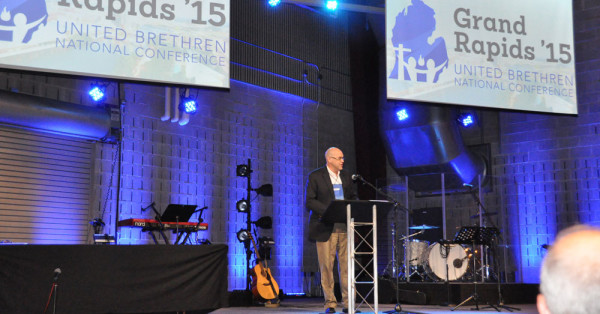
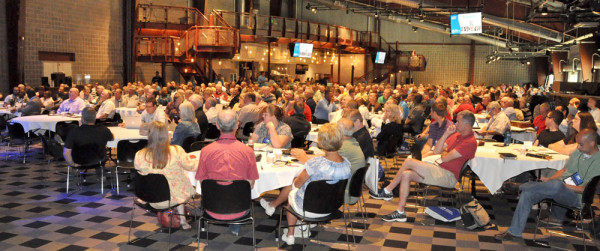
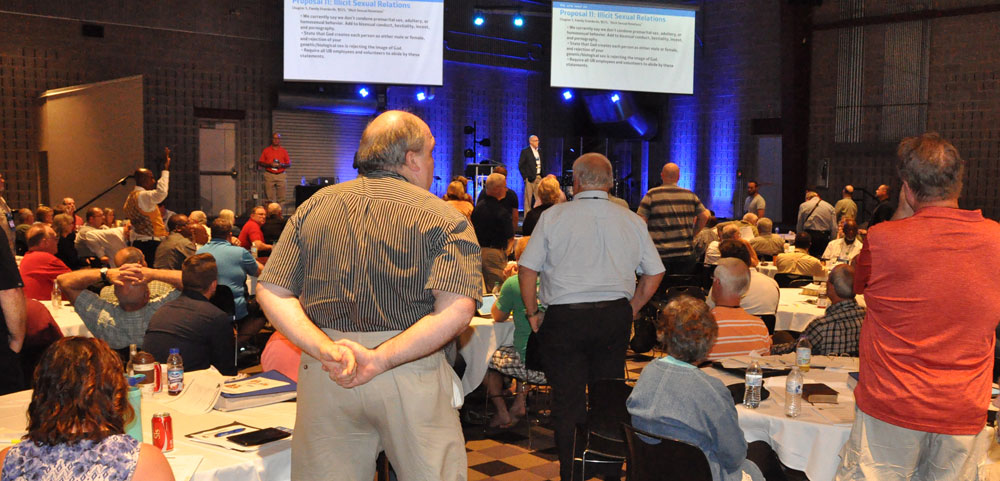
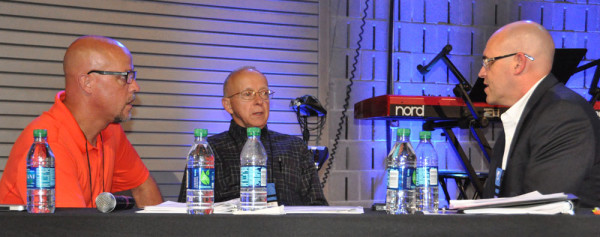
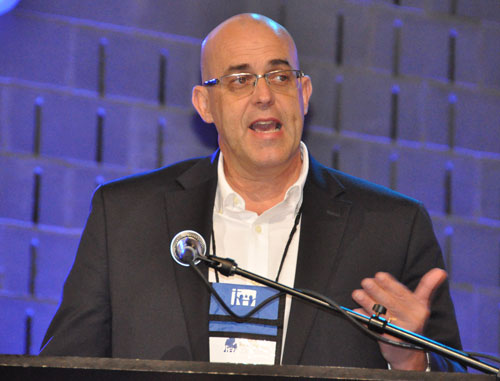
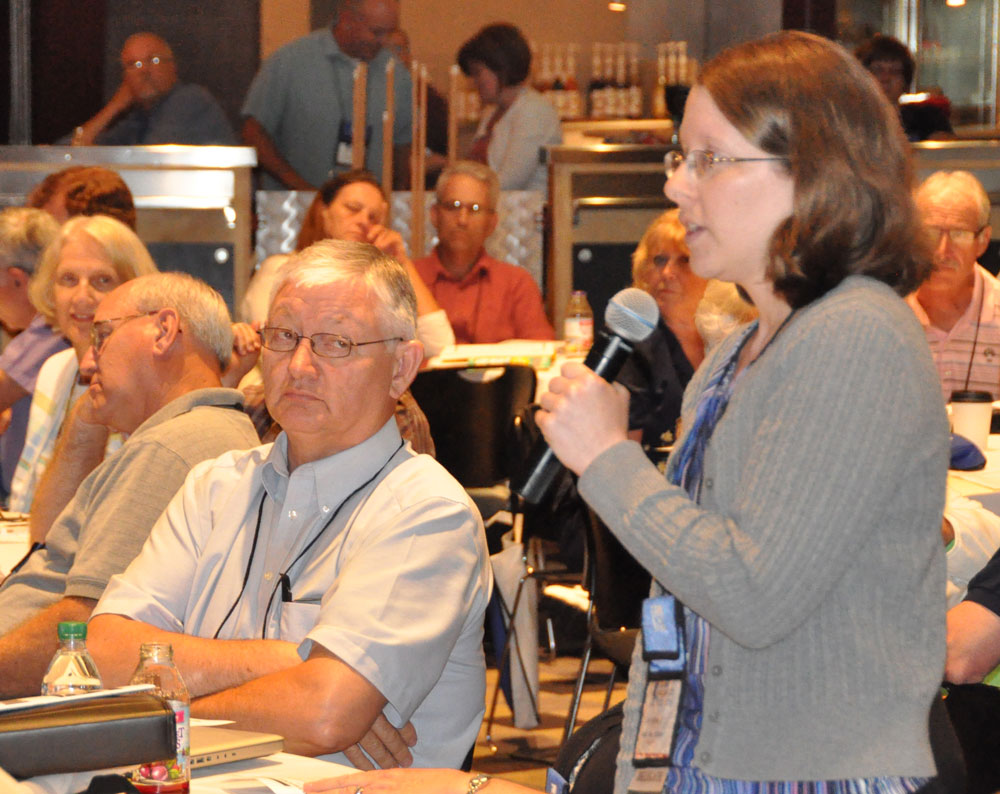
No Comments